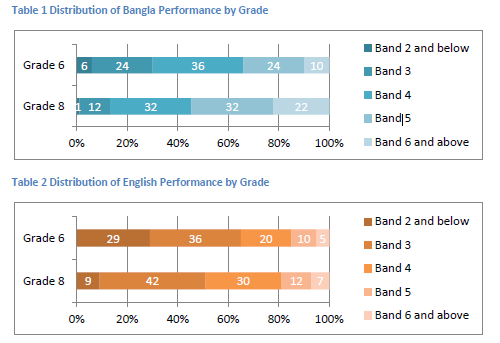
Building standardised assessment capacity in Bangladesh
Research 7 Feb 2019 5 minute readACER India provided technical support on a recent national secondary school learning assessment program in Bangladesh. Ashtamurthy Killimangalam reports.
The Learning Assessment for Secondary Institutions (LASI) is a national assessment administered every two years to Bangladeshi students in Grades 6, 8 and 10. In 2017, the Australian Council for Educational Research (India) was the technical partner to Bangladesh’s Ministry of Education’s Monitoring and Evaluation Wing (MEW), which conducts the LASI, in order to help build the system’s capacity to conduct the assessment independently in future.
LASI is a sample-based assessment of student reading comprehension in Bangla and English, and of mathematics. An important feature of LASI is that it also collects and analyses contextual information that may influence student learning, such as socio-economic factors and school climate, through questionnaires completed by students, teachers and school principals. A sample of more than 67 000 students took part in the 2017 cycle.
In contrast to school-based and classroom-based assessments designed to tell teachers about individual students, standardised assessments such as the LASI provide a system-wide picture of performance that allows for benchmarking over time. Governments use their data to facilitate and guide national policy decisions.
In order for such assessments to be effective they need to be ‘low-stakes’; in other words, they should not be used to rank schools or students, nor should any performance-based incentives be tied to such assessments.
It is common for large-scale, system-wide assessments to focus on reading comprehension in language assessments, excluding other language skills, because it is often not possible to obtain robust, reliable data from large-scale assessments of skills like writing, speaking and listening (or, at least, not in a cost-effective way). This is an important point of difference between large-scale assessments and school-based assessments.
Capacity building for standardised assessments
An essential part of the LASI project was the building of assessment capacity in Bangladesh’s education system so that future cycles could be conducted independently without external support. In previous cycles, ACER India conducted workshops to familiarise participants (teachers, teacher trainers, curriculum experts, and so on) with the best-practice processes followed in test development. ACER India developed all test materials and related documents, such as the assessment framework, which were presented to participants in Dhaka to ensure that they were appropriate for the socio-cultural context. As LASI 2017 progressed, ACER India transferred some responsibilities, such as development of assessment framework and part of the assessment materials, to local stakeholders.
Results: LASI language assessments
LASI language assessments, in both Bangla and English, focused on reading comprehension – a fundamental language skill that impacts students’ ability to perform in all other areas of learning. Results from the 2017 cycle are yet to be reported but the 2015 cycle gives a good picture of the type of data large-scale standardised assessments like LASI yield. Results from the 2015 LASI cycle – in which only students from Grades 6 and 8 were tested – reveal interesting patterns of performance.
The data show an improvement in learning outcomes in Bangla reading comprehension from Grade 6 to 8, as a higher proportion of students reached higher proficiency levels. However, in English, more effort is required to ensure that the low performing students show improved proficiency.

Figure 1: Percentage of students by proficiency level (LASI 2015)
Key findings include:
- The decrease in students at the lowest level of proficiency from Grade 6 to Grade 8 is considerable in both languages.
- In Bangla, 22 per cent of students in Grade 8 have reached the highest proficiency levels compared to 10 per cent of Grade 6 students.
- In English, the number of students at the highest level of proficiency is similar for both grades (5 per cent and 7 per cent).
Skills demonstrated by students ranged from being able to retrieve information from simple texts to making complex inferences in longer, denser texts.
LASI is a good example of a large-scale assessment successfully implemented in the South Asian context, and its data provide a snapshot of national student performance at the secondary level that can be used to guide policy initiatives, resource allocation and interventions.
About LASI: LASI began as an impact assessment study of an educational intervention run by the government in 122 upazilas (sub-districts) called the Secondary Education Quality and Access Enhancement Project (SEQAEP). The first phase of the assessment was completed in 2011.
From its third phase in 2015, the assessment was extended to include all secondary institutions in Bangladesh. Presently, the assessment is conducted by the Monitoring and Evaluation Wing (MEW) of the Ministry of Education and is funded by the World Bank.
Further reading:
Australian Council for Educational Research. (2016). 2015 Learning Assessment of Secondary Institutions. Monitoring and Evaluation Wing, Directorate of Secondary and Higher Education, Government of Bangladesh: Bangladesh. Available at: http://dshe.portal.gov.bd/sites/default/files/files/dshe.portal.gov.bd/page/90422170_577f_4310_a663_b48825efbd6e/LASI%202015%20Public%20Report-%20final_280816.pdf
